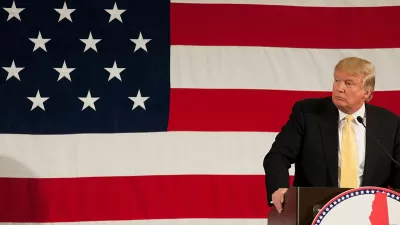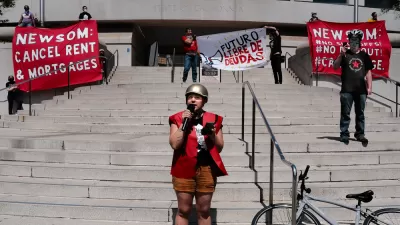President Trump put on a show while signing a batch of executive orders late last week, but on further evaluation, the president's signatures on these orders aren't likely to save anyone from the economic devastation of the coronavirus.

"President Trump took the unusual — and highly controversial — step Saturday of attempting to provide additional economic relief to millions of Americans on his own, without the approval of Congress," explains Heather Long of a news story that most readers are probably familiar with by now--about the president making a show of action as Congress failed to come to an agreement about a relief package, several months after the House approved the HEROES Act and even more after Congress approved the CARES Act.
President Trump signed four executive orders late last week while on the ground of his golf club in New Jersey, as explained by Long: "Trump announced he was postponing payroll taxes through the end of the year, extending the unemployment “bonus” at $400 a week (down from $600), helping people “stay in their homes” and waiving student debt payments through the end of 2020."
But the question remains about whether the executive orders will have a significant effect on the problems they are intended to address—that's the question Long and other writers this week have taken up after inspecting the executive orders. The details, according to Long, "are not as generous as he made them sound."
"He is ordering a payroll tax deferral, not a cut, meaning the taxes won’t be collected for a while but they will still be due at a later date. On housing, he instructs key officials to “consider” whether there should be a ban on evictions. He also insists that state governments pick up the tab for some of the unemployment aid."
The likelihood that lawsuits will also derail some of these measures is also very good, according to Long.
For Bloomberg CityLab, Kriston Capps focuses more directly on the extended eviction moratorium promised by President Trump, weeks after the federal government's previous eviction moratorium, for residents of public housing programs and facilities, expired in July.
"Yet Saturday’s executive order doesn’t renew the federal moratorium on evictions that expired in July. In fact, it doesn’t authorize any new action on evictions or foreclosures at all. Rather it instructs the leaders of several agencies, namely the U.S. Department of Housing and Urban Development, to look again at existing funds or options for protecting renters, without promising any specific relief.
Capps cites experts and advocates like Diane Yentel, the president of the National Low Income Housing Coalition, and Deborah Thrope, deputy director of the National Housing Law Project, to warn readers that a solution to the looming eviction crisis and pandemic depression is not found in president's recent executive orders.
FULL STORY: Here’s what is actually in Trump’s four executive orders

Maui's Vacation Rental Debate Turns Ugly
Verbal attacks, misinformation campaigns and fistfights plague a high-stakes debate to convert thousands of vacation rentals into long-term housing.

Planetizen Federal Action Tracker
A weekly monitor of how Trump’s orders and actions are impacting planners and planning in America.

In Urban Planning, AI Prompting Could be the New Design Thinking
Creativity has long been key to great urban design. What if we see AI as our new creative partner?

San Francisco Mayor Backtracks on Homelessness Goal
Mayor Dan Lurie ran on a promise to build 1,500 additional shelter beds in the city, complete with supportive services. Now, his office says they are “shifting strategy” to focus on prevention and mental health treatment.

How Trump's HUD Budget Proposal Would Harm Homelessness Response
Experts say the change to the HUD budget would make it more difficult to identify people who are homeless and connect them with services, and to prevent homelessness.

The Vast Potential of the Right-of-Way
One writer argues that the space between two building faces is the most important element of the built environment.
Urban Design for Planners 1: Software Tools
This six-course series explores essential urban design concepts using open source software and equips planners with the tools they need to participate fully in the urban design process.
Planning for Universal Design
Learn the tools for implementing Universal Design in planning regulations.
Gallatin County Department of Planning & Community Development
Heyer Gruel & Associates PA
JM Goldson LLC
Mpact (founded as Rail~Volution)
City of Camden Redevelopment Agency
City of Astoria
Jefferson Parish Government
Camden Redevelopment Agency
City of Claremont





























